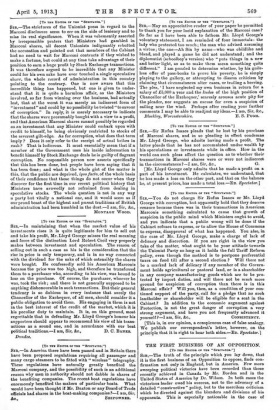[To THE EDITOR OF THE "SPECTATOR."] SIR,—The strictures of the
Unionist press in regard to the Marconi disclosure seem to err on the side of leniency and to miss its real significance. When it was vehemently asserted by irresponsible praters that Ministers had gambled in Marconi shares, all decent Unionists indignantly rebutted the accusation and pointed out that members of the Cabinet had no need to wait for Marconi contracts if they wished to make a fortune, but could at any time take advantage of their position to earn a huge profit by Stock Exchange transactions. It was therefore argued to be incredible that any Minister could for his own sake have ever touched a single speculative share, the whole record of administration in this country pointing to the contrary. One is now aware that this incredible thing has happened, but one is given to under- stand that it is quite a harmless affair, as the Ministers involved, so far from winning over the business, had actually lost, that at the worst it was merely an indiscreet form of "investment" and could by no possibility be twisted "to savour of corruption." In reply, it is merely necessary to indicate that the shares were presumably bought with a view to a profit, and that American Marconi shares cannot possibly be regarded as an investment that any Minister could embark upon with credit to himself, he being obviously restricted to stocks of the severest gilt-edge. As for corruption, what does that term imply ? Does it only refer to the receipt of actual bribes in cash ? That is ludicrous. It must essentially mean that if a member of the Government uses his inside information to benefit himself by Stock Exchange deals he is guilty of flagrant corruption. No responsible person now asserts specifically that this has been done, but people have been saying that it has been done ; and what is the whole gist of the matter is this, that the public are deprived, ipso facto, of the whole basis of their confidence that these things do not occur when they discover for the first time in our recent political history that Ministers have avowedly not refrained from dealing in speculative stocks. The whole question is not in any way a party but vitally a national one, and it would seem as if our proud boast of the highest and purest traditions of British administration had been humbled in the dust.—I am, Sir, &c.,
MONTAGU WOOD.














































 Previous page
Previous page